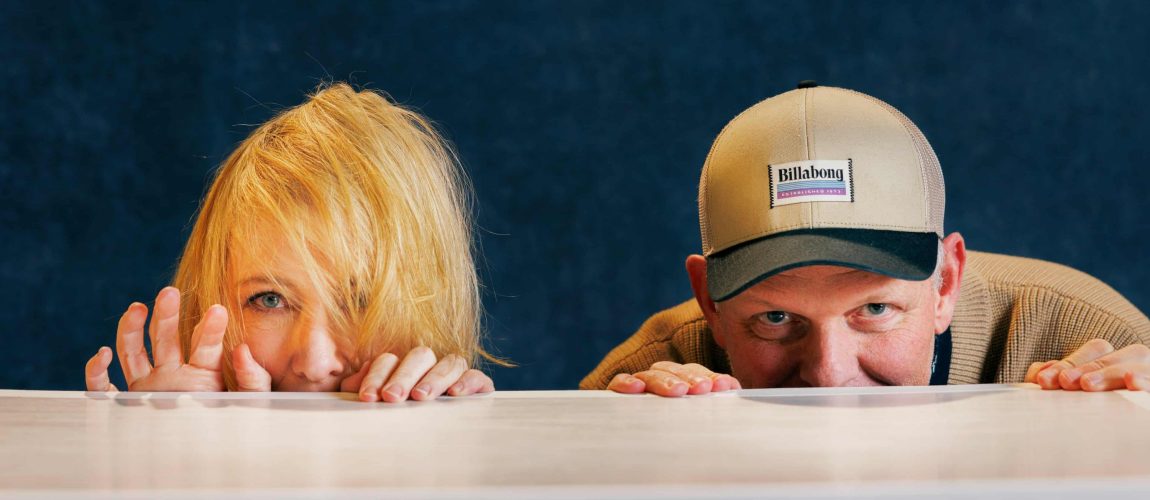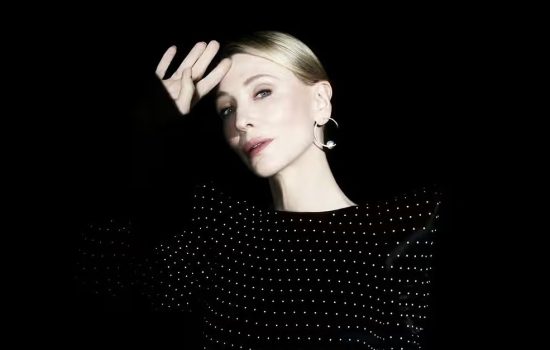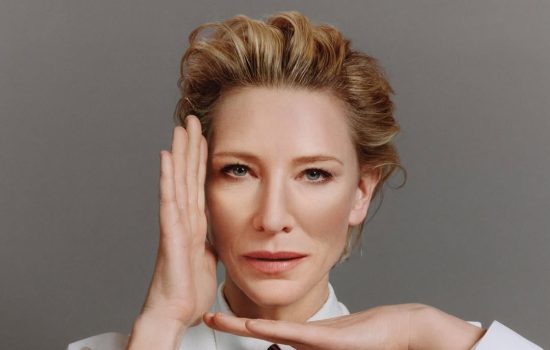Cate Blanchett and Thomas Ostermeier sat down with The Guardian to talk about the upcoming production of The Seagull. The play previews begin next week, 26 February.
Cate is wearing the Cate Blanchett tee from Girls on Tops which can be purchased here. Proceeds from t-shirts sales go towards funding female-led film projects and commissioning female-led film writing.
New batch of tickets are released on Barbican’s site.
JUST ANNOUNCED: #TheSeagull front row £35 @TodayTixUK lottery.
Enter weekly from 18 Feb ? @TodayTixUK
Find out more on the TodayTix app. pic.twitter.com/0W3d5Bx5sY— The Seagull (@TheSeagullLDN) February 14, 2025
The first time Cate Blanchett was cast in The Seagull, she was in Sydney and in her 20s, a young stage actor playing the part of another young stage actor who was desperate for fame and dizzyingly in love. It was 1997, at Belvoir St theatre, and Blanchett was very much in love herself, having recently got together with the writer-director Andrew Upton, who she would marry later that year. Though the part of Ninain Anton Chekhov’s drama involved far more heartbreak – the character is left emotionally wrecked after being dropped by her lover – and Blanchett remembers “I’d just met Andrew and was madly in love and thought: ‘How am I going to go out every night and be broken open when I’m so deeply happy?’”
She clearly pulled it off: among those who saw her in the Australian director Neil Armfield’s production was the director Jane Campion, who reportedly thought Blanchett’s portrayal so “utterly perfect and true” that she wished Chekhov had been there to see it. If the audience fell in love with Blanchett then, she in turn fell in love – with Chekhov’s play: “It’s so fuelled by perplexed, dissatisfied, annoyed people who do really strange things, but in Chekhov those people really are anchored by love,” she says today.
It’s no surprise that almost 30 years later she is returning to the 1896 comedy at the Barbican theatre in London, to play Irina Arkadina, another actor, but this time in her middle years and supremely starry, having made her name on screen and stage. The original drama sees Chekhov’s typically unfulfilled characters become embroiled in a four-way love triangle: Nina is the aspiring actor who falls for Trigorin, a famous writer romantically attached to Arkadina, whose son, Konstantin is, in turn, besotted with Nina and at loggerheads with the artistic values of his famous mother and her lover. It is a play that treads a delicate line between the comic and tragic, and tussles with questions around the value of theatre as well as intergenerational conflict.
Its two central female characters stand at diametric opposites, in love and in the world of the stage. There is an evident synergy between life and art, from Nina to Arkadina, given the trajectory of Blanchett’s career since 1997. “It’s really interesting coming back from inhabiting the equal and opposite end of the spectrum after having a career in theatre,” she says, but she also points out that this production is “profoundly different” because of its director and company of actors, which ranges from Tom Burke and Jason Watkins to Emma Corrin (playing Nina) and Kodi Smit-McPhee (The Power of the Dog) making his professional stage debut as the tormented Konstantin.
Helming the production is Thomas Ostermeier, the artistic director of Berlin’s Schaubühne and a leading light of European theatre, who last year staged a reimagining of Ibsen’s An Enemy of the People, starring Matt Smith, in London’s West End. Ostermeier first met Blanchett in 2011, when he took his acclaimed Hamlet (complete with a soil-covered stage) to Sydney, where she and Upton were then co-directors and CEOs of the Sydney Theatre Company.
Ostermeier remembers that first meeting vividly: “I was blown away when someone called me to say ‘Cate Blanchett wants to meet you.’ I was close to peeing my pants on my way to her house in the taxi. Then we stayed in contact and always wanted to work together.”
We meet at teatime, the end of rehearsals for the day, with Blanchett on one side of a kitchen table and Ostermeier, ever the director, seated at a remove, as if overseeing proceedings. She, in trouser suit, gusts from remote to warm to cold again while he, rangy in casuals and baseball cap, is more smiley and unguarded. Together they are an intense presence, engaged and earnest, with a stilted sense at first that they are performing for each other: the actor and the auteur, in a conversational continuum from the rehearsal room upstairs.
This Seagull is a modern version by Ostermeier and Duncan Macmillan (with whom he co-adapted The Enemy of the People) where characters swear and vape. Arkadina, in the script, “loves applause and chiffon” and Konstantin feels desperately overshadowed by his mother’s celebrity. How does Blanchett find her way into playing a character so seemingly self-regarding, even unlikable? “By not using those adjectives. Just putting them to one side … That term ‘unlikable’ – we’re all unlikable, we’re all absurd.” Does Blanchett like the character, then? “I think you have to love them [the characters], which is different. I love my children [she has three sons and a daughter with Upton] but I don’t always like what they do. All of the characters have warts. You have to love them enough to show those bits.”
Is it easier to prepare for the part of an actor though, as an actor herself? “I guess so but there’s the cliche of what an actor is. I’m not an actor who makes decisions about what I’m going to do before I get on the floor … The temptation is that you can hide behind the mask of what an actress is meant to be and not confront yourself with who you are as an actor.”
Ostermeier has returned to The Seagull repeatedly, staging it at the Schaubühne only two years ago. Ironically, he is not the biggest fan of the play, he says, but it is an opportunity to gather “a great group of actors”. He certainly feels no reverence towards Chekhov’s vision. “You need to say, ‘Ja, you’re Chekhov, one of the greatest, of course you are, but I don’t need to do another religious bow in front of your altar. I need to wrestle with you, I need to play with you and fight with you.’”
It is not a surprising statement from a former enfant terrible, who hit the headlines in 2001 after saying that any director over the age of 40 should retire for being out of touch. Konstantin says exactly that in his play. Given that Ostermeier is now 56, is he poking fun at his younger self through that line?
“I’m constantly trying to make fun of myself. That’s not the only self-referential moment [in the play],” he says, and points me to Konstantin’s rants about modern theatre being overpriced, elitist, indulgent and irrelevant. You imagine Konstantin might complain about the glut of celebrity-led vehicles, too, which are increasingly dominating West End billboards, from Nichole Scherzinger and Sigourney Weaver to Brie Larson currently in Elektra. Present company excepted, of course, is this cynical stunt-casting designed to extract big bucks from people paying to see their screen idols in the flesh? Ostermeier jumps to the defence of his production. “The actors involved in this show all auditioned for it [except Blanchett] and they were simply the best coming out of those auditions.”
Blanchett is thoughtful about the broader picture: “As long as theatre does not become homogenous. It’s about how that person is used and whether their celebrity is harnessed to the cart of the production in a positive way, because sometimes that can really work. But it’s the follow-spot theatre that you’re talking about, where the lead actress or actor is slightly more brightly lit than others … You used the word ‘cynical’. I think you can smell that.”
Neither Blanchett nor Ostermeier grew up in households with theatre running in the blood. It wasn’t affordable for Blanchett’s single mother (her father died when she was 10) or for Ostermeier’s working-class household in Bavaria. “I’m always sad because I know my parents, who are both dead now, could not have afforded to come [to the Schaubühne],” he says. “Even if they were in Berlin they could not have come. I still have in my head how my mother, every evening, after the dishes were done, would sit in the kitchen like this,” he says, and mimes scribbles numbers on paper.
“The money,” says Blanchett.
“Yes, every evening, and then it was like: ‘Oh, OK, we have this much left until the end of the week.”
Full interview on The Guardian








 A Manual for Cleaning Women (202?)
A Manual for Cleaning Women (202?) Father Mother Brother Sister (2025)
Father Mother Brother Sister (2025)  Black Bag (2025)
Black Bag (2025)  The Seagull (2025)
The Seagull (2025) Bozo Over Roses (2025)
Bozo Over Roses (2025) Disclaimer (2024)
Disclaimer (2024)  Rumours (2024)
Rumours (2024)  Borderlands (2024)
Borderlands (2024)  The New Boy (2023)
The New Boy (2023) 











